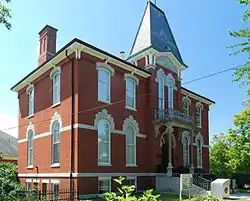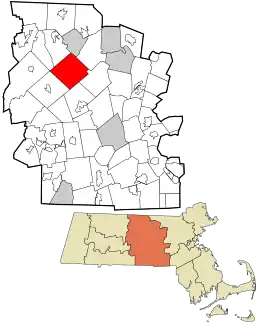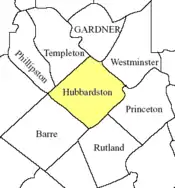Hubbardston, Massachusetts
Hubbardston is a town in Worcester County, Massachusetts, United States. As of the 2020 U.S. census, the town population was 4,328.[1] It is situated 18 miles north of Worcester and 53 miles west of Boston; it is distinguished in Massachusetts by being unusually high at 1015 feet above sea level. [2]
Hubbardston, Massachusetts | |
|---|---|
 Hubbardston Library | |
 Seal | |
 Location in Worcester County and the state of Massachusetts. | |
 Detail of Worcester County map | |
| Coordinates: 42°28′25″N 72°00′24″W | |
| Country | United States |
| State | Massachusetts |
| County | Worcester |
| Settled | 1737 |
| Incorporated | 1767 |
| Government | |
| • Type | Open town meeting |
| Area | |
| • Total | 42.0 sq mi (108.7 km2) |
| • Land | 41.0 sq mi (106.3 km2) |
| • Water | 0.9 sq mi (2.4 km2) |
| Elevation | 993 ft (303 m) |
| Population (2020) | |
| • Total | 4,328 |
| • Density | 100/sq mi (40/km2) |
| Time zone | UTC−5 (Eastern) |
| • Summer (DST) | UTC−4 (Eastern) |
| ZIP Code | 01452 |
| Area code | 351 / 978 |
| FIPS code | 25-31435 |
| GNIS feature ID | 0618367 |
| Website | www.hubbardstonma.us |
History
Hubbardston, the "Northeast Quarter" of Rutland, was incorporated as a separate district in 1767 and named for Thomas Hubbard (1702–1773), Commissary General of the Province of Massachusetts and Treasurer of Harvard College.[3] It is reported in local history that in view of the honor of giving his name to the town, Hubbard promised to provide the glass for the windows of the first meeting house built in town. To make his liberality more conspicuous, the people planned for extra windows, but when Hubbard died in 1773, his estate was so complicated that the town of Hubbardston received nothing and was obliged to glaze the windows at its own expense.[4]
In 1737 Eleazer Brown located on a farm of 60 acres given him by the proprietors of Rutland on the condition that he operate a public house or inn.[5] Until 1746, Brown and his wife were the only inhabitants of Hubbardston. After Eleazer's death (reportedly killed by a deer), Mrs. Brown was then the only occupant of town for several years, and she kept the public house for prominent travelers. In 1749, Israel Green moved into Hubbardston. His daughter, Molly Green, is reported to be the first child born in Hubbardston. Mr. Green was the first chairman of the board of selectmen.[6]
The town's early economy was based on agriculture and small-scale chair, boot, and shoe manufacturing. It is described by historians as a poor town, sparsely settled and almost wholly agricultural, but having sawmills, potash works, and cottage industries such as the making of palm-leaf hats. By the 19th century, dairy and berry farming and market gardening were major pursuits in the town. Immigrants from Ireland, French Canada, England, Sweden, and Finland moved to town to work on local farms.
Hubbardston was represented by 65 men during the Revolutionary War.
Captain Adam Wheeler, one of the leaders of Shays' Rebellion, an armed uprising in central and western Massachusetts, was from Hubbardston.[7] In 1786, eighty men from the town marched to Worcester under Wheeler's command and, joining hundreds of other farmers, took control of the courthouse to protest the widespread foreclosures and seizures of property by creditors that occurred during the cash-poor 18th century.[7][8]
Hubbardston furnished 164 men during the Civil War. 44 were killed or died of illness.[9]
Hubbardston is home to the invention of the first backhoe swing frame developed in July 1947 by Vaino J. Holopainen (pronounced "Waino") and Roy E. Handy, Jr., (thus the company name "Wain-Roy") and assigned to Wain-Roy Corporation of Hubbardston, MA. In July 1948, patent # 2,698,697 was filed by Vaino J. Holopainen.
Geography
According to the United States Census Bureau, the town has a total area of 42.0 square miles (109 km2), of which 41.0 square miles (106 km2) is land and 0.9 square miles (2.3 km2), or 2.19%, is water. Hubbardston is bounded on the northwest by Phillipston and Templeton, on the northeast by Gardner and Westminster, on the southeast by Princeton and Rutland, and on the southwest by Barre.
Demographics
| Year | Pop. | ±% |
|---|---|---|
| 1850 | 1,825 | — |
| 1860 | 1,621 | −11.2% |
| 1870 | 1,654 | +2.0% |
| 1880 | 1,380 | −16.6% |
| 1890 | 1,346 | −2.5% |
| 1900 | 1,227 | −8.8% |
| 1910 | 1,073 | −12.6% |
| 1920 | 1,045 | −2.6% |
| 1930 | 1,010 | −3.3% |
| 1940 | 1,022 | +1.2% |
| 1950 | 1,134 | +11.0% |
| 1960 | 1,217 | +7.3% |
| 1970 | 1,437 | +18.1% |
| 1980 | 1,797 | +25.1% |
| 1990 | 2,797 | +55.6% |
| 2000 | 3,909 | +39.8% |
| 2010 | 4,382 | +12.1% |
| 2020 | 4,328 | −1.2% |
| * = population estimate. Source: United States census records and Population Estimates Program data.[10][11][12][13][14][15][16][17][18][19] | ||
As of the census[20] of 2000, there were 3,909 people, 1,308 households, and 1,071 families residing in the town. The population density was 95.3 inhabitants per square mile (36.8/km2). There were 1,360 housing units at an average density of 33.1 per square mile (12.8/km2). The racial makeup of the town was 98.39% White, 0.15% African American, 0.08% Native American, 0.49% Asian, 0.28% from other races, and 0.61% from two or more races. Hispanic or Latino of any race were 1.33% of the population.
There were 1,308 households, out of which 43.8% had children under the age of 18 living with them, 73.2% were married couples living together, 5.4% had a female householder with no husband present, and 18.1% were non-families. 13.7% of all households were made up of individuals, and 4.5% had someone living alone who was 65 years of age or older. The average household size was 2.97 and the average family size was 3.28.
In the town, the population was spread out, with 31.1% under the age of 18, 4.8% from 18 to 24, 34.6% from 25 to 44, 22.6% from 45 to 64, and 6.9% who were 65 years of age or older. The median age was 36 years. For every 100 females, there were 102.3 males. For every 100 females age 18 and over, there were 100.9 males.
The median income for a household in the town was $61,462, and the median income for a family was $66,058. Males had a median income of $48,730 versus $33,654 for females. The per capita income for the town was $23,072. About 2.1% of families and 3.7% of the population were below the poverty line, including 3.4% of those under the age of 18 and 7.9% of those 65 and older.
Education
Hubbardson is part of the Quabbin Regional School District along with Barre, Hardwick, New Braintree, and Oakham. Elementary school students attend Hubbardston Center School, from grades K to 5, while middle school students attend Quabbin Regional Middle School from grades 6 to 8, and high school students attend Quabbin Regional High School from grades 9 to 12. Starting the 2020–2021 School year, grade 6 was moved up to the Quabbin Regional Middle School.
Government
| County-level state agency heads | |
|---|---|
| Clerk of Courts: | Dennis P. McManus (D) |
| District Attorney: | Joe Early Jr. (D) |
| Register of Deeds: | Katie Toomey (D) |
| Register of Probate: | Stephanie Fattman (R) |
| County Sheriff: | Lew Evangelidis (R) |
| State government | |
| State Representative(s): | Donald Berthiamume (R) |
| State Senator(s): | Anne Gobi (D) |
| Governor's Councilor(s): | Jen Caissie (R) |
| Federal government | |
| U.S. Representative(s): | James P. McGovern (D-2nd District), |
| U.S. Senators: | Elizabeth Warren (D), Ed Markey (D) |
See also
References
- "Census - Geography Profile: Hubbardston town, Worcester County, Massachusetts". United States Census Bureau. Retrieved November 12, 2021.
- "U.S. Bureau of Census". Retrieved June 13, 2011.
- "Hubbard, Thomas". Retrieved February 7, 2014.
- Stowe, John (1881). History of the town of Hubbardston. The Committee. p. 27.
- Reed, Jonas (1836). A history of Rutland.
- Stowe, p.21
- Hubbardston Business Association. "Welcome to Hubbardston". Retrieved August 20, 2008.
{{cite web}}:|author=has generic name (help) - History.com Encyclopedia. "Shays Rebellion". Archived from the original on April 23, 2008. Retrieved August 20, 2008.
- Stowe, John (1881). History of the Town of Hubbardston, Worcester County, Mass: From the Time Its Territory was Purchased of the Indiana in 1686, to the Present. Worcester County, Massachusetts: The Committee. p. 144. Retrieved June 20, 2020.
- "Total Population (P1), 2010 Census Summary File 1". American FactFinder, All County Subdivisions within Massachusetts. United States Census Bureau. 2010.
- "Massachusetts by Place and County Subdivision - GCT-T1. Population Estimates". United States Census Bureau. Retrieved July 12, 2011.
- "1990 Census of Population, General Population Characteristics: Massachusetts" (PDF). US Census Bureau. December 1990. Table 76: General Characteristics of Persons, Households, and Families: 1990. 1990 CP-1-23. Retrieved July 12, 2011.
- "1980 Census of the Population, Number of Inhabitants: Massachusetts" (PDF). US Census Bureau. December 1981. Table 4. Populations of County Subdivisions: 1960 to 1980. PC80-1-A23. Retrieved July 12, 2011.
- "1950 Census of Population" (PDF). Bureau of the Census. 1952. Section 6, Pages 21-10 and 21-11, Massachusetts Table 6. Population of Counties by Minor Civil Divisions: 1930 to 1950. Retrieved July 12, 2011.
- "1920 Census of Population" (PDF). Bureau of the Census. Number of Inhabitants, by Counties and Minor Civil Divisions. Pages 21-5 through 21-7. Massachusetts Table 2. Population of Counties by Minor Civil Divisions: 1920, 1910, and 1920. Retrieved July 12, 2011.
- "1890 Census of the Population" (PDF). Department of the Interior, Census Office. Pages 179 through 182. Massachusetts Table 5. Population of States and Territories by Minor Civil Divisions: 1880 and 1890. Retrieved July 12, 2011.
- "1870 Census of the Population" (PDF). Department of the Interior, Census Office. 1872. Pages 217 through 220. Table IX. Population of Minor Civil Divisions, &c. Massachusetts. Retrieved July 12, 2011.
- "1860 Census" (PDF). Department of the Interior, Census Office. 1864. Pages 220 through 226. State of Massachusetts Table No. 3. Populations of Cities, Towns, &c. Retrieved July 12, 2011.
- "1850 Census" (PDF). Department of the Interior, Census Office. 1854. Pages 338 through 393. Populations of Cities, Towns, &c. Retrieved July 12, 2011.
- "U.S. Census website". United States Census Bureau. Retrieved January 31, 2008.
Further reading
- History of the Town of Hubbardston: From the Time Its territory Was Purchased of the Indians in 1686 to 1881 by Rev. J.M. Stowe; published by the Town of Hubbardston Publishing Committee, Printed by Higginson Book Company, 1881
